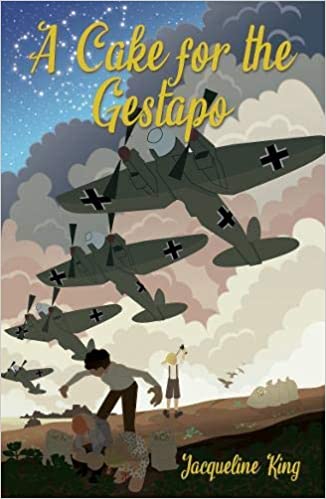
Price: £7.99
Publisher: ZunTold
Genre: Fiction
Age Range: 10-14 Middle/Secondary
Length: 256pp
Buy the Book
A Cake for the Gestapo
It is sometimes easy to forget that part of the United Kingdom was occupied by the Nazis during the Second World War, but here is a novel that reminds us of that fact. Spinner, Clem, Ginger and Joe form a club, the Trotter Club, to ‘fight’ the Germans in their own way. It starts off as a game almost, with catapults and stones which they learned to bounce so that the source could not easily be found. But as the occupation bites it becomes more serious and much more personal when Viktor a particularly nasty Sergeant takes up with Percy’s mother, a French resistance fighter is executed, Percy is taken to France, escapes and returns and the group see what has been done to him and to others. Meanwhile some of the adults are fighting in their own way, and matters come to a head when Clem takes one of the hidden guns.
Gradually the reader sees the situation develop. Each chapter and some sections have a date and time which gives a slow and deliberate build-up of the pressure on these young people. At the beginning of the story they are all at primary school, but Clem and Ginger then go off to secondary school, and each in their own way has a reason to hate the Nazis. Joe’s mother dies partly for lack of the insulin she needs, Spinner’s mother was trapped in England at the beginning of the war, Ginger’s father is in the Royal Navy and Clem’s brother has been killed. Percy who had bullied Spinner particularly, reveals himself to have been a victim too and their reaction to this is credible and heart-warming. The rawness of their emotion is not hidden, hence this story being for the top end of the age range. The death of Joe’s mother is described in detail as is his grief.
There is light relief with Peggy, the very obstreperous pig, used to haul the cart and partial to the seats of German uniforms, and the forming of the music group to annoy the occupying force, but then Ginger plays the Marseillaise as the young Frenchman is taken to his death and suddenly the seriousness of their actions hits home for the reader. At the end the young people were reminded of the seriousness of what they were doing and the danger they were in by Spinner’s father, himself risking his life by spying for the English government.
This is a very fine book indeed, difficult at times to read, but also a realistic and credible picture of that time. It has a real sense of time and place. A fine achievement.




